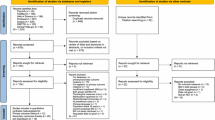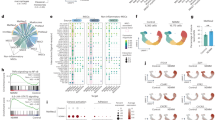Abstract
Background
Peer support has been utilized and associated with clinical outcomes (e.g., improved mood) in patients with solid malignancies. However, to date, there is minimal literature examining peer support among patients with hematologic malignancies and/or patients who have undergone hematopoietic stem cell transplantation (HSCT).
Methods
In accordance with the Preferred Reporting Items for Systematic Reviews and Meta-Analysis (PRISMA) guidelines, we completed a systematic review using five databases to assess the relationship between peer support and clinical outcomes (e.g., distress, physical symptoms) among patients with hematologic malignancies or HSCT recipients.
Results
The eight included studies examined peer support in a total of 574 patients. Four intervention studies highlighted the potential benefits of peer support, such as improved physical symptoms. Two studies, one interventional and one cross-sectional, highlighted the need for more empirically based peer support interventions in the HSCT population.
Conclusion
Among patients with hematologic malignancies and/or HSCT recipients, there is a dearth of literature examining the association between peer support and outcomes, although few studies have described a positive association between peer support and better health outcomes. More randomized controlled studies are needed to better understand the role of peer support and peer support interventions on outcomes in these vulnerable populations.
This is a preview of subscription content, access via your institution
Access options
Subscribe to this journal
Receive 12 print issues and online access
$259.00 per year
only $21.58 per issue
Buy this article
- Purchase on Springer Link
- Instant access to full article PDF
Prices may be subject to local taxes which are calculated during checkout

Similar content being viewed by others
References
Hu J, Wang X, Guo S, Chen F, Wu YY, Ji FJ, et al. Peer support interventions for breast cancer patients: a systematic review. Breast Cancer Res Treat. 2019;174:325–41. https://doi.org/10.1007/s10549-018-5033-2.
Ashbury FD, Cameron C, Mercer SL, Fitch M, Nielsen E. One-on-one peer support and quality of life for breast cancer patients. Patient Educ Couns. 1998;35:89–100. https://doi.org/10.1016/S0738-3991(98)00035-4.
Ashing-Giwa K, Tapp C, Rosales M, McDowell K, Martin V, Santifer RH, et al. Peer-based models of supportive care: the impact of peer support groups in African American breast cancer survivors. Oncol Nurs Forum. 2012;39:585–91. https://doi.org/10.1188/12.Onf.585-591.
Hoey LM, Ieropoli SC, White VM, Jefford M. Systematic review of peer-support programs for people with cancer. Patient Educ Couns. 2008;70:315–37. https://doi.org/10.1016/j.pec.2007.11.016.
Meyer A, Coroiu A, Korner A. One-to-one peer support in cancer care: a review of scholarship published between 2007 and 2014. Eur J Cancer Care. 2015;24:299–312. https://doi.org/10.1111/ecc.12273.
Campbell HS, Phaneuf MR, Deane K. Cancer peer support programs-do they work? Patient Educ Couns. 2004;55:3–15. https://doi.org/10.1016/j.pec.2003.10.001.
Mollica MA, Nemeth LS, Newman SD, Mueller M, Sterba K. Peer navigation in African American breast cancer survivors. Patient Relat Outcome Meas. 2014;5:131–44. https://doi.org/10.2147/prom.S69744.
Kowitt SD, Ellis KR, Carlisle V, Bhushan NL, Black KZ, Brodar K, et al. Peer support opportunities across the cancer care continuum: a systematic scoping review of recent peer-reviewed literature. Support Care Cancer. 2019;27:97–108. https://doi.org/10.1007/s00520-018-4479-4.
Sung H, Ferlay J, Siegel RL, Laversanne M, Soerjomataram I, Jemal A, et al. Global Cancer Statistics 2020: GLOBOCAN estimates of incidence and mortality worldwide for 36 cancers in 185 countries. Cancer J Clin. 2021;71:209–49. https://doi.org/10.3322/caac.21660.
Doubova SV, Terreros-Muñoz E, Delgado-Lòpez N, Montaño-Figueroa EH, Infante-Castañeda C, Pérez-Cuevas R. Experiences with health care and health-related quality of life of patients with hematologic malignancies in Mexico. BMC Health Serv Res. 2020;20:644 https://doi.org/10.1186/s12913-020-05498-7.
El-Jawahri A, Nelson AM, Gray TF, Lee SJ, LeBlanc TW. Palliative and end-of-life care for patients with hematologic malignancies. J Clin Oncol. 2020;38:944–53. https://doi.org/10.1200/JCO.18.02386.
Trevino KM, Martin P, Saracino R, Leonard JP. Unmet need for mental health services in indolent lymphoma: age differences over one-year post-diagnosis. Leuk Lymphoma. 2021;62:1370–8. https://doi.org/10.1080/10428194.2021.1872071.
Gray TF, Temel JS, El-Jawahri A. Illness and prognostic understanding in patients with hematologic malignancies. Blood Rev. 2021;45:100692 https://doi.org/10.1016/j.blre.2020.100692.
Copelan EA. Hematopoietic stem-cell transplantation. N Engl J Med. 2006;354:1813–26. https://doi.org/10.1056/NEJMra052638.
Mohty B, Mohty M. Long-term complications and side effects after allogeneic hematopoietic stem cell transplantation: an update. Blood Cancer J. 2011;1:e16–e16. https://doi.org/10.1038/bcj.2011.14.
Broers S, Kaptein AA, Le Cessie S, Fibbe W, Hengeveld MW. Psychological functioning and quality of life following bone marrow transplantation: a 3-year follow-up study. J Psychosom Res. 2000;48:11–21. https://doi.org/10.1016/S0022-3999(99)00059-8.
Sherman RS, Cooke E, Grant M. Dialogue among survivors of hematopoietic cell transplantation support-group themes. J Psychosoc Oncol. 2005;23:1–24. https://doi.org/10.1300/J077v23n01_01.
Bishop MM, Curbow BA, Springer SH, Lee JA, Wingard JR. Comparison of lasting life changes after cancer and BMT: perspectives of long-term survivors and spouses. Psychooncology. 2011;20:926–34. https://doi.org/10.1002/pon.1812.
Amonoo HL, Johnson PC, Dhawale TM, Traeger L, Rice J, Lavoie MW, et al. Sharing and caring: The impact of social support on quality of life and health outcomes in hematopoietic stem cell transplantation. Cancer. 2021;127:1260–5. https://doi.org/10.1002/cncr.33455.
Mattson MR, Demshar RK, Daly BJ. Quality of life of young adult survivors of hematologic malignancies. Cancer Nurs. 2013;36:E1–7. https://doi.org/10.1097/NCC.0b013e31824242dd.
Page MJ, McKenzie JE, Bossuyt PM, Boutron I, Hoffmann TC, Mulrow CD, et al. The PRISMA 2020 statement: an updated guideline for reporting systematic reviews. BMJ. 2021;372:n71 https://doi.org/10.1136/bmj.n71.
Covidence Systematic Review Software. Melbourne, Australia: Veritas Health Innovation.
Quality Assessment Tool for Observational Cohort and Cross-Sectional Studies. National Heart, Lung, and Blood Institute. Accessed 13 Dec 2021. https://www.nhlbi.nih.gov/health-topics/study-quality-assessment-tools.
Quality Assessment of Controlled Intervention Studies. National Heart, Lung, and Blood Institute. Accessed 13 Dec 2021. https://www.nhlbi.nih.gov/health-topics/study-quality-assessment-tools.
Methley AM, Campbell S, Chew-Graham C, McNally R, Cheraghi-Sohi S. PICO, PICOS and SPIDER: a comparison study of specificity and sensitivity in three search tools for qualitative systematic reviews. BMC Health Serv Res. 2014;14:579 https://doi.org/10.1186/s12913-014-0579-0.
Nørskov KH, Overgaard D, Boesen J, Struer A, El-Azem S, Tolver A, et al. Patient ambassador support in newly diagnosed patients with acute leukemia during treatment: a feasibility study. Support Care Cancer. 2020. https://doi.org/10.1007/s00520-020-05819-w.
Nørskov KH, Overgaard D, Boesen J, Struer A, El-Azem S, Tolver A, et al. Patient ambassador support in newly diagnosed patients with acute leukemia during treatment: a feasibility study. Support Care Cancer. 2021;29:3077–89. https://doi.org/10.1007/s00520-020-05819-w.
Symes YR, Barrington C, Austin J, Wu LM, Fisher EB, Rini C. Advice to patients undergoing stem cell transplant: content analysis of survivor peer support narratives. J Health Psychol. 2018;23:818–28. https://doi.org/10.1177/1359105316648672.
Myrhøj CB, Nørskov KH, Jarden M, Rydahl-Hansen S. The motivation to volunteer as a peer support provider to newly diagnosed patients with acute leukemia—a qualitative interview study. Eur J Oncol Nurs. 2020;46:N.PAG–N.PAG. https://doi.org/10.1016/j.ejon.2020.101750.
Rini C, Austin J, Wu LM, Winkel G, Valdimarsdottir H, Stanton AL, et al. Harnessing benefits of helping others: a randomized controlled trial testing expressive helping to address survivorship problems after hematopoietic stem cell transplant. Health Psychol. 2014;33:1541–51. https://doi.org/10.1037/hea0000024.
Derogatis LR. BSI, Brief Symptom Inventory: administration, scoring & procedures manual. National Computer Systems; 1993.
Zigmond AS, Snaith RP. The hospital anxiety and depression scale. Acta Psychiatr Scand. 1983;67:361–70. https://doi.org/10.1111/j.1600-0447.1983.tb09716.x.
Johnston MWSCWJ. Measures in health psychology: a user’s portfolio. NFER-NELSON; 1995.
Allen SF, Wetherell MA, Smith MA. The Cohen-Hoberman inventory of physical symptoms: Factor structure, and preliminary tests of reliability and validity in the general population. Psychol Health. 2017;32:567–87. https://doi.org/10.1080/08870446.2017.1290237.
Cleeland CS, Mendoza TR, Wang XS, Chou C, Harle MT, Morrissey M. et al. Assessing symptom distress in cancer patients: the M.D. Anderson Symptom Inventory. Cancer . 2000;89:1634–46. https://doi.org/10.1002/1097-0142(20001001)89:73.0.co;2-v.
McQuellon RP, Russell GB, Cella DF, Craven BL, Brady M, Bonomi A, et al. Quality of life measurement in bone marrow transplantation: development of the Functional Assessment of Cancer Therapy-Bone Marrow Transplant (FACT-BMT) scale. Bone Marrow Transpl. 1997;19:357–68. https://doi.org/10.1038/sj.bmt.1700672.
Cella D, Jensen SE, Webster K, Hongyan D, Lai JS, Rosen S, et al. Measuring health-related quality of life in leukemia: the Functional Assessment of Cancer Therapy-Leukemia (FACT-Leu) questionnaire. Value Health. 2012;15:1051–8. https://doi.org/10.1016/j.jval.2012.08.2210.
Aaronson NK, Ahmedzai S, Bergman B, Bullinger M, Cull A, Duez NJ, et al. The European Organization for Research and Treatment of Cancer QLQ-C30: a quality-of-life instrument for use in international clinical trials in oncology. J Natl Cancer Inst. 1993;85:365–76. https://doi.org/10.1093/jnci/85.5.365.
Cohen S, Underwood LG, Gottlieb BH. Social support measurement and intervention: a guide for health and social scientists. Oxford University Press; 2015.
Glover R, Shenoy PJ, Kharod GA, Schaefer A, Bumpers K, Berry JT, et al. Patterns of social support among lymphoma patients considering stem cell transplantation. Soc Work Health Care. 2011;50:815–27.
Nørskov KH, Overgaard D, Lomborg K, Kjeldsen L, Jarden M. Patient ambassador support: experiences of the mentorship between newly diagnosed patients with acute leukaemia and their patient ambassadors. Eur J Cancer Care. 2020;29:1–10. https://doi.org/10.1111/ecc.13289.
Sherman RS, Cooke E, Grant M. Dialogue among survivors of hematopoietic cell transplantation: Support-group themes. J Psychosoc Oncol. 2005;23:1–24.
Matheson L, Boulton M, Lavender V, Collins G, Mitchell-Floyd T. The experiences of young adults with Hodgkin lymphoma transitioning to survivorship: a grounded theory study. Oncol Nurs Forum. 2016;43:E195–E204. https://doi.org/10.1188/16.ONF.E195-E2014.
Rini C, Austin J, Wu L, Valdimarsdottir H, Munshi PN, Goy A, et al. Adhering to recommended lifestyle changes and medications 9 months to 3 years after hematopoietic stem cell transplant: self-reported adherence and the practical, psychological, and social correlates of adherence. Blood. 2018;132. https://doi.org/10.1182/blood-2018-99-119467.
Fisher EB, Boothroyd RI, Coufal MM, Baumann LC, Mbanya JC, Rotheram-Borus MJ, et al. Peer support for self-management of diabetes improved outcomes in international settings. Health Aff. 2012;31:130–9. https://doi.org/10.1377/hlthaff.2011.0914.
Parent N, Fortin F. A randomized, controlled trial of vicarious experience through peer support for male first-time cardiac surgery patients: impact on anxiety, self-efficacy expectation, and self-reported activity. Heart Lung. 2000;29:389–400. https://doi.org/10.1067/mhl.2000.110626.
Casillas JN, Schwartz LF, Crespi CM, Ganz PA, Kahn KL, Stuber ML, et al. The use of mobile technology and peer navigation to promote adolescent and young adult (AYA) cancer survivorship care: results of a randomized controlled trial. J Cancer Surviv. 2019;13:580–92. https://doi.org/10.1007/s11764-019-00777-7.
Høybye MT, Dalton SO, Deltour I, Bidstrup PE, Frederiksen K, Johansen C. Effect of Internet peer-support groups on psychosocial adjustment to cancer: a randomised study. Br J Cancer. 2010;102:1348–54. https://doi.org/10.1038/sj.bjc.6605646.
Jibb LA, Stevens BJ, Nathan PC, Seto E, Cafazzo JA, Johnston DL, et al. Implementation and preliminary effectiveness of a real-time pain management smartphone app for adolescents with cancer: a multicenter pilot clinical study. Pediatr Blood Cancer. 2017;64. https://doi.org/10.1002/pbc.26554.
Sundberg K, Wengström Y, Blomberg K, Hälleberg-Nyman M, Frank C, Langius-Eklöf A. Early detection and management of symptoms using an interactive smartphone application (Interaktor) during radiotherapy for prostate cancer. Support Care Cancer. 2017;25:2195–204. https://doi.org/10.1007/s00520-017-3625-8.
Miyamoto Y, Sono T. Lessons from peer support among individuals with mental health difficulties: a review of the literature. Clin Pract Epidemiol Ment Health. 2012;8:22–9. https://doi.org/10.2174/1745017901208010022.
Klineberg E, Clark C, Bhui KS, Haines MM, Viner RM, Head J, et al. Social support, ethnicity and mental health in adolescents. Soc Psychiatry Psychiatr Epidemiol. 2006;41:755–60. https://doi.org/10.1007/s00127-006-0093-8.
Acknowledgements
Time for this work was supported by the National Cancer Institute through grant K08CA251654 (to HLA) and by the National Heart, Lung, and Blood Institute through grant R01HL113272 (to JCH). AEl-J is a scholar in clinical research for the Leukemia & Lymphoma Society.
Author information
Authors and Affiliations
Contributions
All authors made substantial contributions to conception and design, acquisition of data, or analysis and interpretation of data. All were involved in drafting the article or revising it critically for important intellectual content. All provided final approval of the manuscript and agree to be accountable for all aspects of the work.
Corresponding author
Ethics declarations
Competing interests
The authors declare no competing interests.
Additional information
Publisher’s note Springer Nature remains neutral with regard to jurisdictional claims in published maps and institutional affiliations.
Rights and permissions
About this article
Cite this article
Amonoo, H.L., Harnedy, L.E., Staton, S.C. et al. Peer support in patients with hematologic malignancies: a systematic review. Bone Marrow Transplant 57, 1240–1249 (2022). https://doi.org/10.1038/s41409-022-01709-3
Received:
Revised:
Accepted:
Published:
Issue Date:
DOI: https://doi.org/10.1038/s41409-022-01709-3



